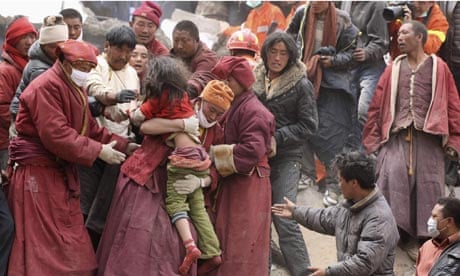As the wall shook around him, Sonam Dandron snatched up his grandson and fled their home. Without a thought for his son, daughter and other relatives, he ran to check on a revered Buddhist lama living nearby on the hillside.
"I cried out when I saw he was trapped in the rubble and his leg was covered in blood. But he said 'go back and save your children'," the stonecutter recalled.
Three of his young grandchildren died when the quake struck Yushu Tibetan prefecture on Tuesday morning, wiping out Taklung monastery and its surrounding community. Yesterday, it emerged the death toll throughout the region had risen to 1,144. Many residents believe it is higher, citing the number of dead bodies they have seen gathered at various spots.
At Taklung, just east of Jiegu town, at least 88 of the 1,000 residents have died and a handful more remain buried in debris. Most of the monastery has collapsed; what remains is too dangerous for search teams to enter. Buddhas sit serenely amid the wreckage, but stupas (Buddhist monuments) have toppled on the hillside.
Homes have simply been erased; all that is left is a jumble of bricks and wood falling down the slopes. But for many in the area the damage to their culture is at least as painful as their homelessness and personal bereavement. "Of course I care about losing my grandchildren, but it's not so bad. The worst thing is the monastery," said Sonam Duden. "It's 800 years old, has so many treasures the monks and ordinary people all respect and protect. It is the most important thing for our lives."
The 62-year-old, whose family has lived by the monastery for generations, added: "Tibetans try to protect our culture and religion and language and heritage. I hope when people come and see what's happened they will help us to rebuild it."The emotion is shared by the young. "Having no monastery is like having no home," said Gazen Tsudran as she brushed away tears. The teenager was camped out with her grandmother and mother on what had once been their home.
Relatives arrived at lunchtime, hoping to take them somewhere safer. Many of Yushu's inhabitants had already fled. On the road out of Jiegu, vans and cars – some without windscreens due to quake damage – were stuffed with families and their belongings. But 83-year-old grandmother Tsechu put her foot down. "Even if you kill me, I will not move from this monastery. I want to die here," she said.
In an acknowledgement of Buddhism's importance to the region, the Chinese Premier, Wen Jiabao, chose Taklung for his second surprise visit to the quake zone – clambering up the rubble, before addressing the crowd gathering in its courtyard. "In these rescue efforts, monks have shown a great performance; on many occasions I have seen them saving people," He said: "Please be assured we will not only save people and restore houses, but will do a good job of restoring your monastery." Throughout Jiegu, monks could be seen digging through the wreckage, sometimes in concert with the specialist rescue teams. Tenzin Yundun, the abbott of Sershul Monastery, said he had brought hundreds of monks to the area, with the support of the local government in the first 24 hours they pulled 60 survivors from collapsed buildings; soon after, they had provided 3,000 with tents and food.
They had even set up a solar powered charging station, so families could use their mobile phones to reach relatives. But While residents of the tent city that has sprung up on the town's racetrack were grateful for voluntary rescue efforts, there was widespread grumbling at what many perceived as the slow response of authorities.
A woman at the racetrack said: "This is not like the TV reports. They said a lot of donations are coming in, but go and have a look – people don't have any supplies."
In another sign of underlying tensions, many Tibetans insisted the earthquake had been set off by mining in the area, despite no evidence to suggest extraction can cause such tremors.
But three days after the quake struck, more substantial provisions were arriving. In the late afternoon, hundreds of people who had waited from early morning for tents triumphantly bore them away were triumphant as soldiers began to unload lorries full of supplies.
As night fell, scores of army trucks and other rescue vehicles were still heading into the area. Some teams had come from as far away as Southern Hainan Province. But there are some duties that only the monks can perform. Pulling their russet shawls over their heads to protect them from the grey dust sweeping across the racetrack, they chanted together in front of a truck. Its back was piled high with shrouded corpses; close by stood another dozen cars, their boots open to reveal more bodies wrapped in blankets or encased in mud.
Normally the monks would prepare the bodies for a sky burial. But the vultures are glutted, they explained, and will eat no more. Instead, the lamas said they would cut the corpses into pieces and feed them to the fish in a big river.
